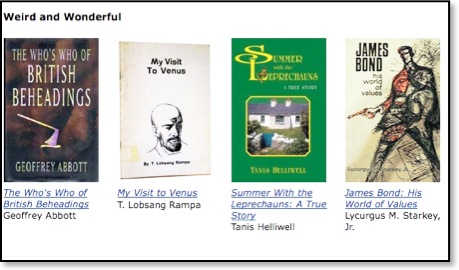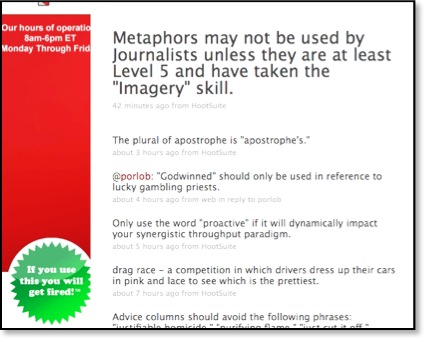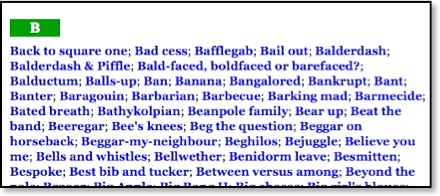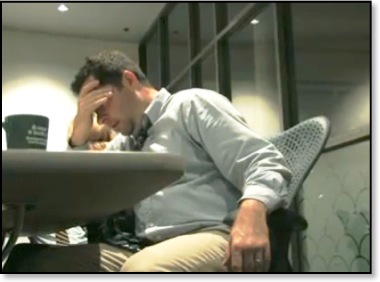eBooks outsold print this Christmas
Spare a thought for the humble hardback this Christmas. It seems the traditional giftwrapped tome is being trumped by downloads, after Amazon customers bought more e-books than printed books for the first time on Christmas Day.
As people rushed to fill their freshly unwrapped e-readers – one of the top-selling gadgets this festive season – the online retailer said sales at its electronic book store quickly overtook orders for physical books. Its own e-reader, the Kindle, is now the most popular gift in Amazon's history.
Lots more on the trends...
Nomadic workers for Amazon
"Every shift starts with what they call a 'Stand Up.' You gather in one area with your usual department—ours was called 'Sortable Singles,' which sounds like it should be the name of a dating site—and they'd count off how many people they needed in each department. Run through a few announcements. Give you a few safety tips. And then they lead you through five minutes of group stretches."
Cherie was mainly a packer, putting items in the box and scanning them. Chris, on the other hand, was a "water spider." He explains, "A water spider is responsible for keeping all the packers supplied, so ideally they'd never need to stand up and leave their station to get any other supplies like all the different sizes of boxes, plus making sure their tape machines and paper-spitter machines are operating."
"I never quite exactly figured out why they call it a water spider. My guess is back in the history of assembly line jobs, the water spider would be the person who would bring people on the line water to drink. Nobody seemed to know!"
I don't think I agree with this list at all
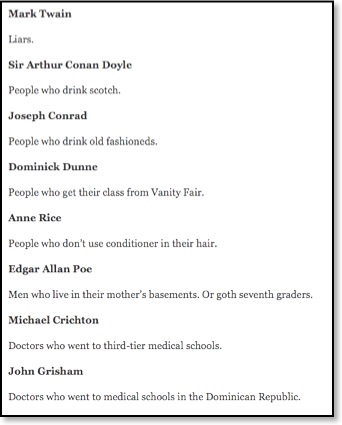
Great bookshelves

Happy Solstice and happy social media
Magazine digital readers
Sara Öhrvall runs the research and development at Bonnier Corporation in Sweden, a company that publishes a number of magazines in the United States, including Saveur and Ski Magazine. She sent along a video of a virtual prototype of a re-imagined magazine. It’s all theoretical: A device capable of displaying the magazine as conceived does not exist, so the demonstration is achieved with some dark-room magic.
The so-called Jesus Tablet, the One We Have All Been Waiting for from Apple, will reportedly be out some time early next year. Will it be the game-changer the iPhone was? Hard to say, but you can bet it will go nowhere unless publishers have some content ready that will jump up big and pretty when it is launched. The Bonnier approach shows real promise. Simple, easy interface with a minimum of buttons. Of particular interest, at least to nerds like Decoder, is the ability to “rub” content, which then “heats up” and offers options for deeper investigation. Let us know if you think they are on to something.
There's a video...
Best lists time!
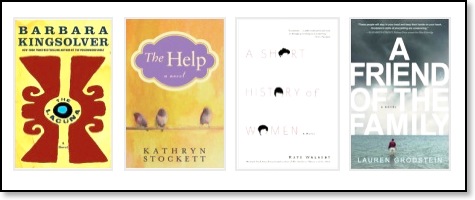
The end of the year always brings lists of "bests." Here's one of the best fiction of the year from Bookpage.com:
A Friend of the Family by Lauren Grodstein
A Short History of Women by Kate Walbert
The Help by Kathryn Stockett
The Lacuna by Barbara Kingsolver
Let the Great World Spin by Colum McCann
Wolf Hall by Hilary Mantel
Her Fearful Symmetry by Audrey Niffenegger
Lark and Termite by Jayne Ann Phillips
The City & The City by China Mieville
The Girl Who Played with Fire by Steig Larsson -- ooo I know the guy who translated this!!
Search and the end of hand-crafted content
Over the weekend I tried to buy a new dishwasher. Being the fine net-friendly fellow that I am, I began Google-ing for information. And Google-ing. and Google-ing. As I tweeted frustratedly at the tend of the failed exercise, "To a first approximation, the entire web is spam when it comes to appliance reviews".
This is, of course, merely a personal example of the drive-by damage done by keyword-driven content -- material created to be consumed like info-krill by Google's algorithms. Find some popular keywords that lead to traffic and transactions, wrap some anodyne and regularly-changing content around the keywords so Google doesn't kick you out of search results, and watch the dollars roll in as Google steers you life-support systems connected to wallets, i.e, idiot humans.
Google has become a snake that too readily consumes its own keyword tail. Identify some words that show up in profitable searches -- from appliances, to mesothelioma suits, to kayak lessons -- churn out content cheaply and regularly, and you're done. On the web, no-one knows you're a content-grinder.
The result, however, is awful. Pages and pages of Google results that are just, for practical purposes, advertisements in the loose guise of articles, original or re-purposed. It hearkens back to the dark days of 1999, before Google arrived, when search had become largely useless, with results completely overwhelmed by spam and info-clutter.
Google has to know this. The problem is too big and too obvious to miss. But it's hard to know what you can do algorithmically to solve the problem.
Do read the rest, about content farms.
The end of hand-crafted content
So what really scares me? It’s the rise of fast food content that will surely, over time, destroy the mom and pop operations that hand craft their content today. It’s the rise of cheap, disposable content on a mass scale, force fed to us by the portals and search engines.
On one end you have AOL and their Toyota Strategy of building thousand of niche content sites via the work of cast-offs from old media. That leads to a whole lot of really, really crappy content being highlighted right on the massive AOL home page. This article, for example, is just horrendous. One of AOL’s own blogs trashes the company’s spinoff, rambles for miles without any real point, and adds a huge factual error to top things off (”the company is losing money”). Hiring a bunch of people who couldn’t keep their old media jobs and don’t have the stomach to go out on their own and then slapping little or no editorial oversight onto these masses of sub-par journalists leads to an inevitable conclusion – cheap, crappy content. And that crappy content is given a massive audience on the AOL portal.
On the other end you have Demand Media and companies like it. See Wired’s “Demand Media and the Fast, Disposable, and Profitable as Hell Media Model.” The company is paying bottom dollar to create “4,000 videos and articles” a day, based only on what’s hot on search engines. They push SEO juice to this content, which is made as quickly and cheaply as possible, and pray for traffic. It works like a charm, apparently.
These models create a race to the bottom situation, where anyone who spend time and effort on their content is pushed out of business.
We’re not there yet, but I see it coming. And just as old media is complaining about us, look for us to start complaining about the new jerks.
My advice to readers is just this – get ready for it, because you’ll be reading McDonalds five times a day in the near future. My advice to content creators is more subtle. Figure out an even more disruptive way to win, or die. Or just give up on making money doing what you do. If you write for passion, not dollars, you’ll still have fun. Even if everything you write is immediately ripped off without attribution, and the search engines don’t give you the attention they used to. You may have to continue your hobby in the evening and get a real job, of course. But everyone has to face reality sometimes.
Forget fair and unfair, right and wrong. This is simply happening. The disruptors are getting disrupted, and everyone has to adapt to it or face the consequences. Hand crafted content is dead. Long live fast food content, it’s here to stay.
Fact check and tag at the same time, as a contract business?
Fact-Checkers and Certified Public Logicians
It's fantastic that so much written knowledge is becoming generally accessible and cross-linked these days, but this is just an intermediate stage-- a universal library on the way to becoming a universal brain. The missing piece is encoding the underlying meaning of the stored text, the deep-structure logic behind it. It's one of the oldest challenges in Computer Science, and there has been lots of progress and companies dedicated to doing this. Powerset, for example, has software that has parsed and can answer questions from all of Wikipedia.
The thing is, you really still need a person to get it most reliably right, because people understand the way the world works. Luckily, we already have people whose job is very close to doing this already-- they're called fact-checkers or researchers, and they work for every reputable publication.....
I have wondered for years, as magazines, newspapers, and other news organizations have been hemorrhaging money and employees, why someone hasn't gone into the contract fact-checking business. Like, it could be an extension of Snopes.com. There's a huge redundancy in every publication having their own research desks, so they could lay off all of their fact-checkers and then outsource the job to the new, independent company that the best of them then all go to work for. Meanwhile, the company could also be hired by anyone else. Then, when the public sees the "Fact-Checked by MiniTrue (SM)" seal on someone's independent blog, they know the information there has the same credibility as the big boys.
Now, what if these fact-checkers didn't just vet and correct the text? While they dig into the logic and accuracy of everything, as usual, they could also use some simple application to diagram the sentences and disambiguate the semantics into a machine-friendly representation. Just a little extra clicking, and they could bind all the pronouns to their antecedents, and select from a dropdown box to specify whether an instance of the string "Prince" refers to the musician Prince or to Erik Prince-- the president of XE, the company formerly known as Blackwater-- within an article that for whatever reason mentions both of them.
Then you would really have something. The text wouldn't just be fact-checked; its underlying meaning could be added into a shared pool of human knowledge, chained through, verified or denied, and used in other ways by any technology that may now exist or may exist in the future.
Delaying ebook publishing to sell the hardbacks
Frankly I am surprised that it took this long. But today, we read in the Wall Street Journal that two major publishers have decided to pull a music industry mistake. Simon and Schuster and Hachette Book Group have announced that they will not release most eBook editions until the hardbacks have been on shelves for four months....
Correction: This move is about the past of your business.
I have two very important messages to offer the book industry (most all of them clients, so I'm trying to be delicate here, the way a group of friends running an intervention for an alcoholic have to act even if it involves summoning tough love). The first message is the hardest to hear and it will make me some enemies. But the second message offers some hope and I encourage you book types to give it a fair hearing, because I have history and economics on my side.....
Message #1: Dear book industry, I'm so sorry to tell you this, but your books really aren't worth $25. Just like newspapers weren't really worth what people were paying for them and magazines, either. And CDs, and DVDs. These were all worthy of a high price when analog economics were the only economics. When people understood that they paid $25 to get some paper, ink, and a binding, all of which had to be warehoused, shipped, and slotted on shelves in warm stores with muzak and imported coffee odors wafting through the environment.
A digital book suffers from none of those impediments. Therefore: it should be cheaper. Stop glorying in historical prices and accept the fact that a digital book should not cost $25 unless it comes with some awesome, exclusive premium that makes it worthy of such a price. Otherwise, $9.99 is darn awesome a price to pay, given how cheap it is to deliver an eBook (which has fewer bytes in it than a TV episode sold for $1.99 on iTunes). ...
Message #2: You can actively window in a way that doesn't alienate consumers. Just as I want you to charge a fair price for your digital content, I want you to be able to sell physical books for as long as a majority of consumers still want them. So here's my proposal: Rather than creating artificial scarcity by holding eBooks back four months, why not dynamically price your offerings so that a consumer who really wants that new Stephen King book on his or her digital reader can get it the same day as the hardback.
Go sniff your books
In a report in ACS' Analytical Chemistry, a semi-monthly journal, they describe development of a new test that can measure the degradation of old books and precious historical documents based on their smell. The nondestructive "sniff" test could help libraries and museums preserve a range of prized paper-based objects, some of which are degrading rapidly due to advancing age, the scientists say.
Matija Strlic and colleagues note in the new study that the familiar musty smell of an old book, as readers leaf through the pages, is the result of hundreds of so-called volatile organic compounds (VOCs) released into the air from the paper. Those substances hold clues to the paper's condition, they say. Conventional methods for analyzing library and archival materials involve removing samples of the document and then testing them with traditional laboratory equipment. But this approach destroys part of the document.
More about the smell of books...
Go add your opinion about online indexes
I've been kicking around an odd idea ever since starting Rosenfeld Media—the idea of a union index, a compilation of all of our books' indices. Now that we've actually got a few books out (#6 is due in about six weeks), it's time to revisit the idea and consider the indices' collective potential.
Want to help me figure it out?
First, imagine a single, combined index—possibly a single page—that'd reference whichever books where an index entry occurred. Then picture the ability to filter that index by individual title. Now we're ready for some questions:
Go comment at Rosenfeld Media!
The index from World Wide Words
This is not my office
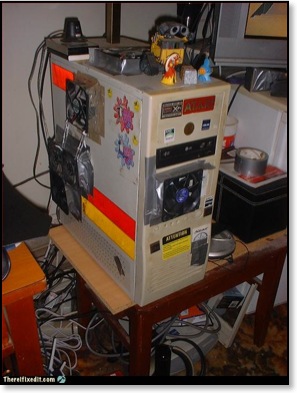
Whew. I thought my office was bad. But it now seems sane and serene.
More insanity at http://thereifixedit.com/
Android eBooks next?
Android ebook coming soon.
If you had doubts that Android was taking over the world, this should help to convince you otherwise as Google’s OS (which was only released one year ago) is now spreading to the ebook reader market, as Netronix is planning to release eBook readers sporting Android.
Netronix, a Taiwan company better known for their network equipment, have recently ventured into eBook readers. Their current incarnation is selling well, with them reporting to DigiTimes that they are moving 60,000 a month. Netronix is now working with Texas Instruments to work on an eBook reader that will run Android.
eBook sales in one author's life
My five Hyperion ebooks (the sixth one came out in July so no royalties yet) each earn an average of $803 per year on Kindle.
My four self-pubbed Kindle novels each earn an average of $3430 per year.
If I had the rights to all six of my Hyperion books, and sold them on Kindle for $1.99, I'd be making $20,580 per year off of them, total, rather than $4818 a year off of them, total.
So, in other words, because Hyperion has my ebook rights, I'm losing $15,762 per year.
His total sales and calculations are here.
This is going to break my heart
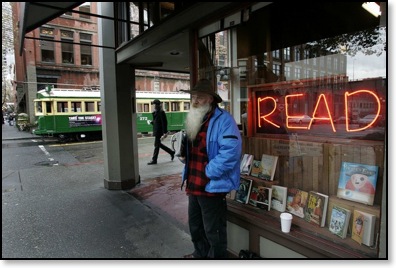
The Elliott Bay Book Co., long a fixture in the city's Pioneer Square, may have to shut its doors. It's a long story with plenty of villains.
Amid the blues bars and rescue missions of Pioneer Square, Seattle's storied intersection of sports and booze, art and vagrancy, the Elliott Bay Book Co. has stood as a symbol of comfortable, old-world erudition.
For years, it has been one of the West's few destination bookstores, a place tourists and locals alike visit for the sake of spending a couple of hours getting lost in its 140,000-some neatly stacked titles. When the last actual book downloads onto Kindle (at Amazon.com on the other side of town), Elliott Bay, one feels sure, will still be selling its musty, hard-bound predecessors, perused with a tangy cup of espresso in the basement cafe.
So it is with no small degree of anguish that Seattle has reacted to the news that Elliott Bay is facing the likely choice of either moving across town or closing altogether when its lease is up Jan. 31....
Elliott Bay has always done more than sell books.
It has the most active reading program in the country, holding more than 500 readings a year in its intimate, book-filled gathering room downstairs.
Bill Clinton, Norman Mailer, Salman Rushdie, David Lynch and Richard Russo have all read and talked in the space that seems to invite lively, back-and-forth conversation.
The cozy, independently run cafe, also downstairs, is rumored to be the inspiration for Cafe Nervosa on the Seattle-based television series "Frasier."
Upstairs, on the main floor, there is an entire wall of staff-recommended books, and the shelves throughout the store are flecked with handwritten cards from the store's knowledgeable staff.
Thom Chambliss, executive director of the Pacific Northwest Booksellers Assn., said independent bookstores could survive competition from online retailers, but the killer blow is being struck by big-box retailers who are deeply discounting the easy-to-sell, big-name bestsellers that normally allow stores like Elliott Bay to also stock shelves with wild bird catalogs, biographies of obscure feminists, first novels of new regional authors, and treatises on the politics of climate change.
"It's a problem for the country, not just the industry, if we don't have stores capable of making a profit while stocking all the 'backlist' books," he said.
"That will really hurt the cultural opportunities for this country. People's access to ideas will be seriously compromised. And that discussion is not taking place in this country."
More here... It would be hard to face a world without Elliott Bay. I spent a lot of hours in that cafe and in the bookshelves.

